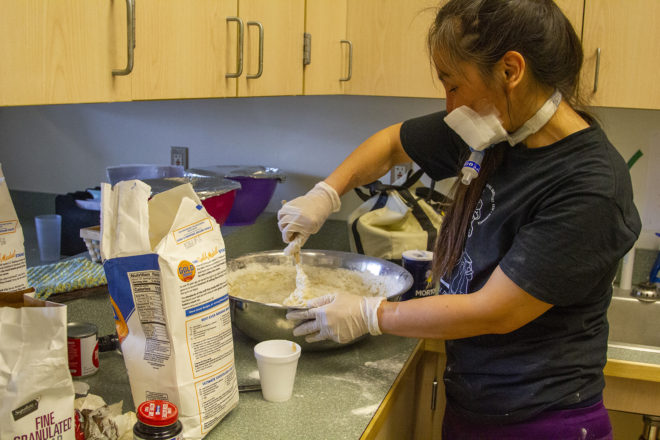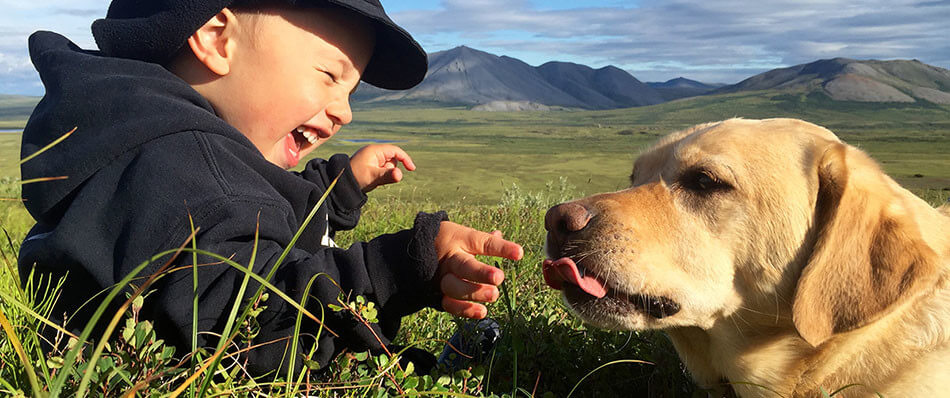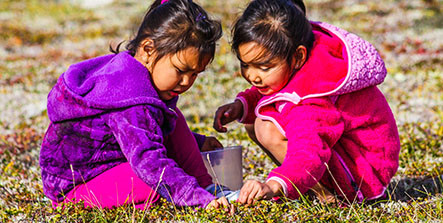
The room filled with the sound of busy hands, the grinding wood creating a swooshing beat and an atmosphere not unlike that of an industrious
beehive.
The youth were making ice fishing jigs to allow them to catch food for their families this spring.
It was just one of several activities that Norton Sound Health Corporation’s IÑUA Program and the Kawerak Wellness Program worked together to bring to Elim April 13-15, carrying a message of suicide prevention among young people.
The sister programs worked with over 100 students, holding talking circles and sharing stories during the school day. The community celebrated
with an evening of frybread tacos and Native dancing.
It wasn’t the first time sixth-grader Mariah Daniels had made a fishing jig. Last year, she used her own homemade jig to catch tomcod upriver.
“It’s fun, and it’s part of our culture, too,” Mariah said.
Her older cousin, eighth-grader Katya Daniels, said being able to blend their subsistence lifestyle with school makes them feel more engaged.
“It means a lot. It’s fun and exciting, and we’re always happy to do it,” the older Daniels said.
One of the event’s organizers, Carol Seppilu, IÑUA outreach coordinator, is an ultra-marathon runner and advocate for mental health. As a teenager, Seppilu survived a suicide attempt. Now her goal is to encourage others to live healthy lifestyles, focusing on the importance of traditional activities.
“I’d like to see us strengthen the cultural connection with our people, especially with the younger generation,” she said. “Our culture is a very important part of our lives and a very strong protective factor against suicide. We’re doing a lot more cultural activities and keeping it alive.”
While some students were working in the wood shop, others filtered into the school library to watch the documentary film I am Yup’ik, about a teenager determined to lead his small village’s basketball team to a district tournament, creating a source of pride and healing for his community.
After the film, the floor was opened to sharing stories that included some personal accounts and some words handed down from elders. There were stories of the ever-mischievous little people, stories of wolves and mysterious whistling in the dark, and stories of crab fishing and preserving beluga.
When an adult asked whether the students enjoyed getting out on the land, all 20 hands shot up enthusiastically. The Daniels girls said they try to take advantage of all outdoor activities Elim life has to offer. The cousins recalled stories of relatives hunting oogruk (bearded seal) and animatedly spoke of cutting beluga that the hunters had brought home.
“It’s so yummy,” the girls said. “It’s the best!”
Elim was the third community to host a Wellness Week this year. IÑUA and the Kawerak Wellness Program will next visit Savoonga. During the visits, program staff organize cultural activities, share resources with community members, and encourage anyone who needs support to contact NSHC Behavioral Health Services.
“We let people know, we’ve been to therapy,” said Kira Eckenweiler, IÑUA’s prevention planner. “It’s okay to seek out help, and it’s okay to need help. There’s no shame.”
Eckenweiler appreciates visiting communities that are open to having deep conversations about mental health and suicide. She strives to share a message of hope with people around the region.
“We’re a strong people, we’re a happy people, we can do this,” she said. “We are so capable of living happy, healthy, thriving lifestyles.”


